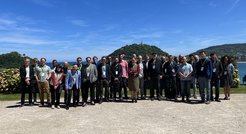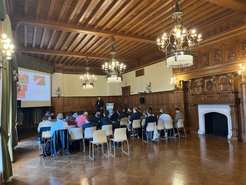Big Ideas workshop shines light on the future of quantum science
How can today’s quantum research contribute to a future where materials are controlled by light? To what extent can light manipulation, materials and recent progress in quantum optics be harnessed for future scientific and technological advances?
Those were just some of the key questions discussed at the recent “Big Ideas for Light and Materials” workshop, organized by the Max Planck-New York City Center on Non-Equilibrium Quantum Phenomena from May 29 to May 31 in San Sebastián, Spain. It took place at the Palacio de Miramar, the former summer residence of the Spanish royal family, whose retreat-like atmosphere provided an ideal setting for the event.

The workshop was an important forum for exchange and discussion amongst leading researchers from the United States, Germany and Switzerland. It dealt with a broad spectrum of topics linked to the new era of quantum science, ranging from novel spectroscopic and theoretical tools to artificial lattices of matter and light, quantum optics and materials.
“This was a truly dynamic event with many novel and transformative aspects,” says Angel Rubio, Deputy Director of the New York Center and managing director of the MPSD. “Lots of new scientific ideas were put forward that will clearly shape this research field for the coming years.”
Kenneth Burch, Professor of Physics at Boston College, also praised the scientific exchange at the workshop: “The caliber of participants was truly exceptional, with a high-level discussion of numerous technical developments that are opening the door to ground-breaking discoveries. It is clear the future of using light to understand and control the quantum properties of materials is bright.”

Experimental and theoretical scientists at the Max Planck New York Center have produced many ground-breaking studies and key insights in the material sciences since its inauguration in 2019. Their work paves the way for the use of quantum technologies in a wide spectrum of applications, such as quantum computing, advanced sensing technologies or cryptography.
The Center is a collaborative venture between the MPSD and the Max Planck Institute for Polymer Research in Germany, as well as Columbia University and the Flatiron Center for Computational Quantum Physics in the United States. It has just had its second funding period approved, with Cornell University signing up as the fifth partner institution.













